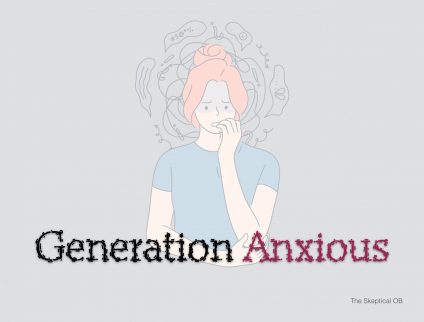
One hundred years ago the people who Americans now refer to as the “Greatest Generation” were children and young adults. That was the generation that lived through a massive financial depression and grew to fight an existential war against Nazi Germany.
In contrast, if we were to characterize the contemporary generation of children and young adults we might do well to refer to them as “Generation Anxious.” On nearly every parameter of mental health Generation Anxious is doing worse than previous generations, with anxiety being a particular problem.
What happened?
No one knows for sure, but I’m beginning to wonder if our current obsession with therapeutic parenting has something to do with it.
My generation of parents spent the childhoods of their offspring ever anxious about their mental health. “Experts” insisted that children’s psyches are both infinitely malleable and exquisitely fragile. Parents, therefore, were tasked with creating positive mental health by preventing negative experiences and the negative emotions that are presumed to lead to psychological damage. Any childhood unhappiness made parents wonder what they were doing “wrong.”
Has parental anxiety over child rearing been transmuted into child anxiety about simply existing?
Consider:
The Greatest Generation was raised in ways that our current philosophy of parenting, therapeutic parenting, finds anathema. They were fed formula, put on rigid schedules, seen and not heard. Discipline was often harsh to the point that we might now consider abuse.
Generation Anxious wasn’t raised so much as cultivated. We breastfed, let children set whatever schedules they preferred, curated their experiences, encouraged any and all emotions and preferences, and attempted to reason with them instead of disciplining them.
We were promised they would be happier and, instead, they more miserable.
But wait! Aren’t we living through a time of unprecedented downward economic mobility?
Actually it’s not unprecedented. The Greatest Generation lived through an economic depression of massive unemployment and utter impoverishment far exceeding any economic discomfort we see today. Yet they were less anxious.
What about our vicious political environment with its bigotry, cruelty and threats to democracy?
That’s not unprecedented either. Despite appalling contemporary prejudice, it does not come close to the racism, anti-Semitism and misogyny experienced by the Greatest Generation. And there was no greater threat to both democracy and the lives of Americans than World War II. Yet they were less anxious.
But Generation Anxious has just endured a pandemic that disrupted so much of every day life. Yet even that is not unprecedented. The Greatest Generation was preceded by a massive worldwide epidemic of influenza. More people died in the epidemic than in the Great War that had come immediately before it. Yet the Greatest Generation was less anxious.
Obviously the massive increase in anxiety disorders among today’s children and young adults involves a multiplicity of factors. But one thing is pretty clear: the improvements in mental health we were promised by experts promoting therapeutic parenting have not occurred; things have actually gotten worse.
Is therapeutic parenting — which made an entire generation of parents anxious about their children’s mental health — responsible for the rise of Generation Anxious?
We don’t yet know the answer, but it is certainly worth asking the question.

